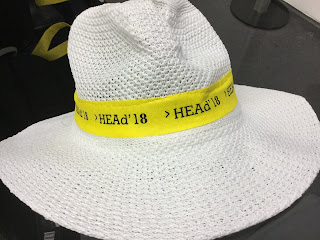During the i2c2 conference, I gave everyone challenges to complete - Daan Van Loon's was to write a summary of the conference! So here it is...
“Is
this normal for a library conference?”
-
the old me –
I have been to conferences before, as a
linguist, an historian, musician, teacher, even as an actor. But this was my
first library conference, and I was very much aware of that fact as I walked
out of the Joseph Rowntree Conference Hall on Cober Hill, near Scarborough, on
Tuesday morning. Something was happening, and not only to me. Anthropologists
state that it is possible for panic to act like a contagious disease.
Inspiration can do that as well. I know. I was there.
It started with the announcement that we
had to create our own nametag. Before I knew it I was chatting with fellow
colleagues on how there can never be enough feathers on a badge, how orange
sharpies had to be somewhere in the vicinity and musing on whether my own badge
would pale in comparison to the incredible creations of my peers. Looking back,
it is clear that we probably almost all had that feeling, as ‘hidden under any
bushel you will find twenty-four librarians, apologizing for taking up space’.
To hell with linear reports, I will come back to that first afternoon later. I
want to go the start, the thing that changed us. The keynote by Emma Coonan,
presented on Tuesday morning of the 14th of November. She showed us a mirror,
her own mirror image, the mirrors that we create around us and the mirrors that
we should always use, but almost never do.
Be free to fail. Do not distance yourself,
but stay close. Be humble. Be proud.
I do not know whether she had anticipated
this, whether Andrew Walsh had anticipated it, but Emma showed us all a side of
being a librarian that took us exactly where we had to be. At least, that was
what happened to me. It felt like we all shed some weight, moved out of our
library traditions, corporate duties and fears, and became a group of friends,
eager to spend more time together. Eager to play and eager to create. And then
there was Lego. I like Andrew’s comment on twitter after the conference, that
‘it isn’t about the Lego’. It was about what we envisioned the Lego to be.
Animals, ideal librarians, everybody nodding along to completely different
interpretations of the things that we do and the things that we are. I have not
felt more at home in a work-related environment in years. We talked about how
innovation can be blocked, how hard it can be to overthrow old perceptions and
prejudice. We laughed about all those obstacles that stand in our way, because
we are free to fail. Proud and humble.
I love how memory is not a linear thing,
because my mind has connected all the amazing and inspiring papers that were presented
to that first keynote. Because they were about how we could create new ways to
be librarians, using sound, zines, theater, games, embedding ourselves, mapping
and having spaces to make stuff. They were about how easy it is to fail, but
also about how rewarding it is to try, or to paraphrase my dear colleague from
Chattanooga, Tennessee: ‘there are countless roads to your destination. The one
that gets you there is the right one’. I think that at that point, had the I2C2
conference been finished, I would have been satisfied, having been truly
inspired. Then the second keynote happened.
Rosie Jones told us, on Wednesday morning,
that she only had a PowerPoint so that she would not sidetrack too much. She then
took all that energy, all the inspiration, the creativity and open ideas of the
previous days and started to mold it. Rosie talked about how to get out into
the real world and actually use that inspiration as a librarian. To use
failures in a professional capacity, to not be daunted by the weight of
responsibility. To play. If you think that something is starting to get too
bureaucratic, change it. A meeting with too many points on the agenda? Change
it. Boring conferences without any interaction? Change it. Let people cheat at
your games, because it is not the game that matters, but that it is played. And
fail, fail badly.
When I got back to my library yesterday, my
colleagues asked me how the I2C2 conference was. What the latest intel on
information literacy is. If I have any new ideas. I talk about Lego and play
do, about meeting lovely people, about feeling secure enough to play the piano
for them in the morning. About cider tasting, ice-cream and steampunk folk. It
is only after that first round of standard chitchat that I suddenly turn
serious and say that I have probably just been changed for life. That I will
probably not forget this first library conference as long as I am a librarian.
That I feel sad that it is already over but ready to rumble at the same time.
There is now a post-it on my laptop. It says:
Be free to fail. Do not distance yourself,
but stay close. Be humble. Be proud. And PLAY.
Daan van Loon
17-11-2017




